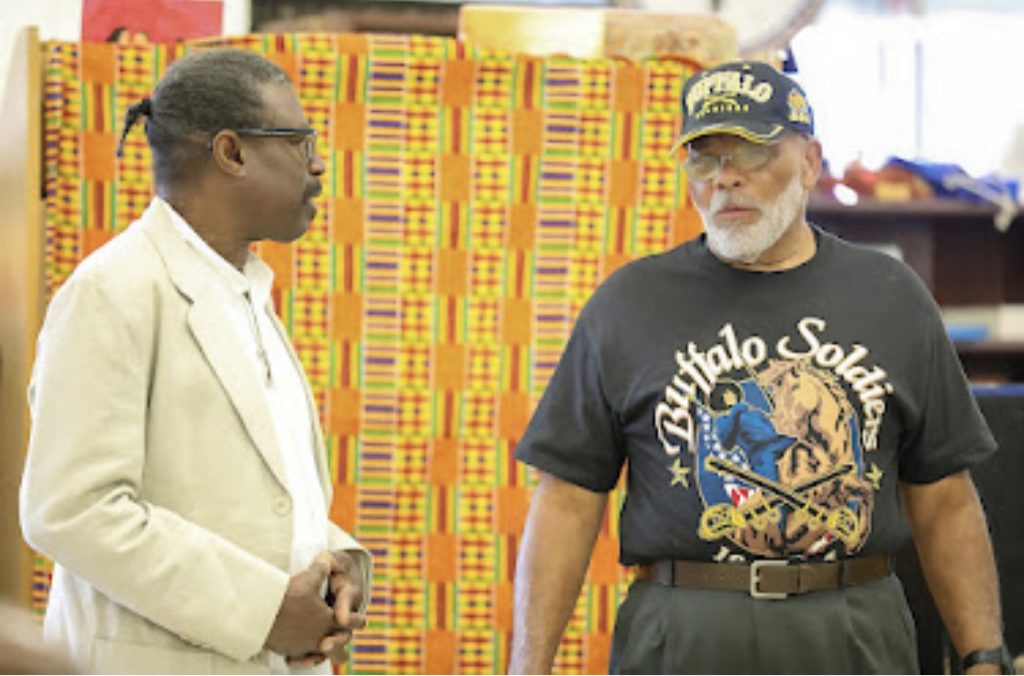By Allen R. Gray
There are people who refuse to revel in the merriment of Independence Day—sucking on rib bones and watermelon rinds; and randomly busting explosives—in homage to a nation that based its very worth on the notion of inalienable rights, while bathed in the hypocrisy of a feigned freedom for Black people.
Soon after the fireworks and revelry subsided, a panel of historians, filmmakers and Civil Rights advocates gathered at Dallas’ Pan-African Connection Bookstore Art Gallery and Resource Center soon after the stirs of celebrations for Juneteenth and July 4th. The panel met to fill in the gaps of understanding when it comes to being Black and being free in America by screening and discussing a documentary of a decades-old event. “Betrayal of Justice: A Buffalo Soldier Story” is a haunting and poignant documentary that reflects the brutal and inhumane side of human nature that was most prevalent at the turn of the 20th century.
The panel, moderated by talk radio host Ed Gray, was comprised of producer Lindell Singleton, Dr. Jacquelyn Cook Kyle, Co-executive producer, Reed Hadley of Jaris and Associates, Sam Allen, Chief of Police (Retired), and Fort Worth pastor and Civil Rights advocate K.P. Tatum. Nearly 100 guests joined the distinguished panel.

The exhumation of the meticulous details of historical events is always a difficult undertaking. But the more hideous events of Black history, though, have been buried so deep that Indiana Jones could not dig it up.
Singleton, the film’s writer, and director was able to give voice and vision to the ghosts of the Black soldiers that either died or were executed as a result the so-called Houston Riot that was brought about by sadistic police and white mob violence. The “Riot” occurred during one of the bloodiest periods in America’s racial conflict, and eventually resulted in the largest courts-martial and murder trials in our nation’s history. The detailed facts of that dank, rainy August night were never brought forth as not a single witness was called by the military tribunal to either confirm or deny what unfolded during the skirmish.
The panel maintained that integral parts of Black history like the story of the Black soldiers of Camp Logan have been deliberately buried in obscurity by white society; and measures like the Critical Race Theory will only bury Black history deeper still.
“Critical Race Theory is taking information out of schoolbooks that should be there for the sake of (true) history,” Gray stated. “It is part of our history.
“That is the significance of this film,” Gray contended. “That is the significance of why you are here today.”
Director Singleton said he became involved in the production of the film when Allen asked that he do a 30-second promotional as a commemorative of the 100th anniversary of the Camp Logan incident. Singleton shared that when he looked deeper into the facts surrounding the Houston incident, he became hooked. The 30-second promo mutated into 15-minute documentary…and the documentary will evolve into a four-part exploration of how the case affected the Black men and their families.
“We won’t get better unless we know the (unaltered) truth,” Dr. Kyle stated.
Dr. Kyle submitted that “fictive kinship” would have one consider that injustice affects not only the victim soldiers, but it also causes harm to the family of the victims. “The cycle (of injustice) has to be broken, and anything we can do as people to break that cycle has to be done.”
History is often spoken of as though it were a thing exclusively of the past, yet the more insidious aspects of our historical past have a way of sprouting when it is least wanted. It could be easily argued that the anti-Black political climate that existed in Houston, Texas (1917) in many ways exists in today’s political climate.
Hadley, who is from New York but spends much of his time traversing the nation, says, “I see it pretty much the same across the country…The agenda is to suppress (Black freedoms). It’s going to be done any kind of way.” Hadley’s fear is that despite the efforts of members of the panel—and other champions of civil rights— “It’s (social injustice) not going to change.”
The meteorological climate in Houston on August 23, 1917, the night of the clash, the temperature was near one hundred degrees, and it was pouring rain—but the climate that allowed this travesty of justice to exist back then is not so different than the social climate that presents itself more and more today.
The ire of Pastor Tatum was moving as he stood in agreement with Hadley as he compared at least two incidents in Fort Worth in 2016 and 2017 where police were called to a crime scene and innocent Black women were “manhandled” by police, because police have “complete disregard for Black women.” In 1917, the racial skirmish was initiated when Houston police abused a blameless Black woman.
“When that soldier saw the police manhandle that woman, he had to interject himself regardless of the consequences,” Pastor Tatum vehemently stated. He contends that today there is a shortage of Black men that have the “heart” to make a stand regardless of the consequences.
“The courage of that soldier to lay it all on the line is the reason we are here today.”
The ultimate point to be considered is: When does one man’s inalienable rights end and another man’s inalienable rights begin?
The answer is all too often as simple as Black and white.




